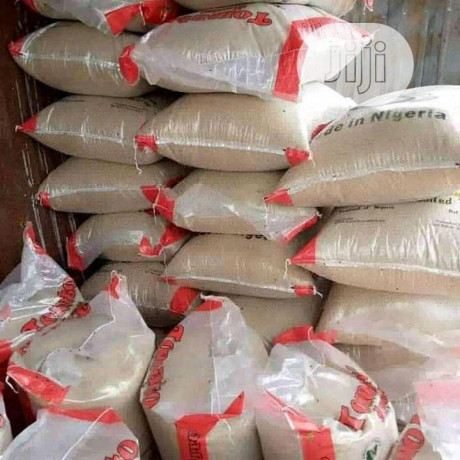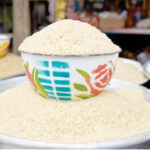The Minister of Finance, Budget and National Planning, Dr. Zainab Shamsuna Ahmed, startled Nigerians recently when she was quoted as saying in an interview that the current high price of rice, Nigeria’s staple food, is due to the activities of smugglers. I hope that those who interviewed the honourable minister did not misquote her. If that is the case, then she has definitely added a fresh perspective to the economics of price discovery. Even so, the application of such a theoretical framework may be limited to analysis of Nigeria’s rising food security challenges.
No doubt, smugglers are enemies of the economy, producers and all people who engage in genuine economic activities. They alter the domestic prices of goods by undercutting local producers or legitimate importers of such goods. They evade official tariffs and other statutory duties and therefore are able to sell the smuggled goods at lower prices, undercutting responsible and legitimate producers and importers who subject themselves to the full obligations of a responsible citizen as may be enshrined in the government’s policies.
That is why smugglers are harmful to the local economy because their underground activities are in favour of the foreign producers and as they smuggle in the goods, they are exporting jobs that our youths would have had through local production and as they evade the statutory obligations, they are denying all of us of the good roads, hospitals and schools that the government would hopefully have built with the resources if only they pay their duties.
So, by driving away locally produced goods in place of their smuggled and illegally cheaper items, smugglers create unemployment at home while creating jobs in foreign countries. They waste our foreign currencies on avoidable imports and throw Nigerians into more poverty, as their imports put the Naira on a spiral devaluation/depreciation. The smugglers, ignorantly or deliberately, in collaboration with their actors, including some in public service who assist them in the destructive venture, usher in inflation and impoverish the masses.
Smugglers deny the government the benefit of collecting legitimate taxes on foreign goods; at the same time, they rob the state of the opportunity of collecting excise duties on locally produced goods by driving local producers underground.
Smuggling is a common feature of the Nigerian business scene. It is evident at virtually all of the country’s land borders and one begins to wonder the essence of the borders, where trucks become invisible, as we continue to speak big grammar of “porous border”. With Nigeria’s borders described as being “porous”, the drivers of the underground economy have mastered all the tricks they need to survive and beat whatever measure the government’s agencies devise, sometimes if not most times, with the connivance of the gatekeepers.
It is so prevalent in the country that a couple of years ago, one of the powerful men who have been on the corridors of power in Nigeria declared that even a train could be smuggled into the country. It sounds like an exaggeration, but certainly, the retired Army General knew what he meant.
So, it is logical for the minister to paint smugglers black because that is what they are in reality of economic parlance but they may be all, but not the cause of the rising price of rice in Nigeria. If the statement credited to the minister is true, it may be apt to ask: How can smuggling be increasing prices? How can this be, given that smuggling, though bad and unhealthy for the economy, increases the supply of rice? So, how can an activity that increases supply be responsible for a price increase of a normal good?
If the smuggling of rice into the economy is truly contributing to the rising price of the commodity locally, then there is a fundamental force at work that needs to be identified and properly explained in the context of the peculiarities of Nigeria’s economy.
Indeed, if truly we have resolved the problem of local rice production and are now self-sufficient, smuggling of rice should have naturally been a dead business because our local rice should be cheaper or at least be able to compete with imported ones, except we are accepting that we do not have a competitive advantage in local rice production and in which case we may need to redefine our national economic strategy on this staple food.
Interestingly, several billions of naira have gone into incentivising rice farmers and processors over the past six years, including the CBN’s Anchor Borrowers Programme, which seems to have been inherently misconceived as a gift by many rice farmers and whoever has benefited from it, as the apex bank may now be struggling with the repayment of the loan.
While the CBN gives banks a five per cent threshold for NPLs, the speculated delinquency rate on the Anchor Borrowers’ Programme is in multiples, reinforcing the argument of some stakeholders that the CBN should not have gotten directly involved in lending to farmers. Rather, they say, it should have adopted the on-lending approach through banks, which obviously have better standards, network, risk management and governance practice to manage such programme in a way that ensures better recovery.
If the CBN were to be a regular financial institution, with commercial cost and risk capital, it would by now probably be gasping for breath on the Anchor Borrowers’ Programme portfolio, which seems to have been masked with variants of recovery challenges. Yet, the price of rice keeps soaring, a fact which undermines the success of the programme.
Are farmers deliberately increasing prices, in the expectation that the ban on imported rice puts Nigerians at their mercy? This is not necessarily so. The truth is that in some rice-growing places, rainfall this year came late, which negatively impacted the performance of the crop. This, coupled with the impact of the insecurity in the land, has further reduced the supply of rice in the country. So, like most other crops, the local supply has been affected.
This is a phenomenon that seems to have rekindled the strong interest of smugglers who now see a strong arbitrage opportunity in trading imported rice like never before. Indeed, what has happened in some cases is that the price of local rice seems to have risen to match the price of (smuggled) foreign rice. As bad as the activities of the smugglers are, it has possibly moderated the rise in the price of rice, as the supply from smugglers complements local production. The government should possibly have permitted importation and set rules and standards, including limiting the volume to what is required to bridge the local supply gap and earnings relevant revenues on them, rather than the leakage of such revenues through illicit activities of some officials who collude with smugglers to defraud all of us. Could this be what the minister was referring to?
Despite the impact of Naira devaluation on the price of imported rice, it perhaps still makes a cheaper and perhaps better alternative today. Do we say that Nigeria lacks a competitive advantage in rice production and if yes, then what exactly do we have a competitive advantage in producing?

 Join Daily Trust WhatsApp Community For Quick Access To News and Happenings Around You.
Join Daily Trust WhatsApp Community For Quick Access To News and Happenings Around You.


